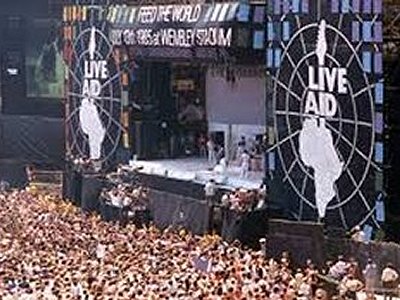LIVE AID'S LEGACY
The generosity which inspired July 13, 1985 is still present in the British public and looks for avenues of expression
It is said that everyone remembers where they were when Live Aid happened on July 13, 1985. It’s not hard: they were in front of the TV. Three decades on we are able to make a mature account of the event. But first the cultural critique: were Status Quo really allowed kick off the biggest rock concert in history? Who exactly were The Hooters? And why was Nik Kershaw invited at all?
It was the making of some reputations and the breaking of others. Adam Ant’s decision to trail his new single extinguished one of rock’s shorter careers. Queen’s tight set of greatest hits ensured posterity beyond Freddie Mercury’s death. U2’s slot, which saw Bono leap from the stage to find a partner, leaving his band mates busking, unexpectedly established them as the world’s biggest band in waiting.
There were plenty of egos on display that day, but the whole event (at Wembley at least) was typically British, even if organised by an Irishman. Each band had twenty minutes and tiny spaces in which to prepare, there were no frills and little corporate hospitality. Looking back there is the sense of the inexorable about Live Aid; Bob Geldof was a force of nature who would not take no for an answer. He flattered, cajoled and threatened stars into appearing. Yet the whole event might so easily have flopped and Geldof was still in a panic on the day. Crib sheets had to be handed round for the final rendition of Do they know it’s Christmas?
The wider account may include the following. It established a new generation of giving and prefaced the global reach of digital media in addressing human problems. The concept of aid and development and the place of Africa in the world’s agenda received a boost. The generation of politicians that included Tony Blair, Gordon Brown and David Cameron, were influenced by the event: Blair’s 2005 Commission for Africa was the centrepiece of Britain’s Presidency of the G8. In the middle of a decade renowned for free market individualism, Live Aid shed a different light on human motivation, being an icon of the Big Society before the phrase was coined. Compassion and generosity were lauded, not mistrusted or despised.
At a more superficial level, Live Aid put rock and roll on the front pages of the newspapers, making celebrities of its participants and contributing to our current obsession with this cult. Stadium rock got a fresh life, making the filling of Wembley Stadium the true benchmark of global success.
The virtue and potential which inspired that day are still present in the British public and ones the Church aspires to harness: the motivation of cause and conscience; a genuine and spontaneous sense of community (mimicked in a shallow way in today’s flash mobs); the global reach of moral duty. If there is a hardening in the moral sensibilities of people today, there remains fertile ground where we might be helped to see our God-given obligation and privilege to care for the poor and needy.
It is unlikely to happen in the same way again, for the media is so invasive and controlling now; it is also unlikely that the organiser would leave the stadium at night and end up thumbing a lift from an unsuspecting motorist into town. Geldof’s quixotic legacy endures, even if some of his acts didn’t.
POPULAR ARTICLES

Obama's Covert Wars
The use of drones is going to change warfare out of all recognition in the next decades.

Through A Glass Starkly
Images of traumatic incidents caught on mobile phone can be put to remarkable effect.

What Are British Values?
Is there a British identity and if so, what has shaped the values and institutions that form it?



